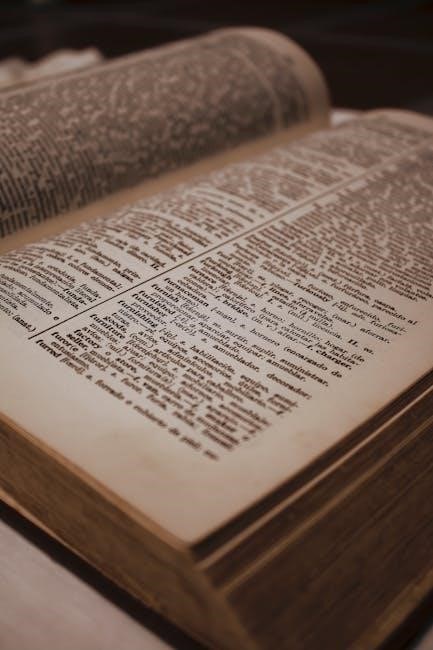The Odyssey, an ancient Greek epic poem attributed to Homer, recounts Odysseus’s perilous journey home after the Trojan War. Robert Fitzgerald’s translation offers a modern, accessible interpretation of this foundational Western literary masterpiece, blending poetic elegance with fidelity to the original text, making it a classic choice for scholars and readers alike.
1.1 Overview of the Epic Poem
The Odyssey, attributed to Homer, is one of the greatest epic poems in world literature, recounting Odysseus’s 10-year journey home to Ithaca after the Trojan War. Composed in ancient Greek, it explores themes of heroism, loyalty, and cunning, while delving into human and divine complexities. The poem’s non-linear narrative and rich storytelling have made it a cornerstone of Western literature, influencing art, philosophy, and culture for millennia. Robert Fitzgerald’s translation captures its poetic essence, blending style with fidelity to the original, making it a timeless classic.
1.2 Historical Context and Significance
The Odyssey, an ancient Greek epic poem, is believed to have originated in the 8th century BCE, reflecting the oral storytelling traditions of Mycenaean Greece. It follows Odysseus’s journey home after the Trojan War, exploring themes of heroism, loyalty, and divine intervention. As a sequel to The Iliad, it solidified Homer’s legacy as a foundational figure in Western literature. Robert Fitzgerald’s translation has played a pivotal role in preserving its historical significance, offering a modern yet faithful interpretation that has shaped its enduring influence and accessibility for contemporary readers.

Background of Robert Fitzgerald’s Translation
Robert Fitzgerald’s translation of The Odyssey, first published in 1961, is celebrated for its poetic elegance and faithfulness to Homer’s original work, earning widespread acclaim.
2.1 Who is Robert Fitzgerald?
Robert Fitzgerald was an American poet, critic, and translator, best known for his renderings of classical Greek and Roman works into English. Born in 1910, he was a prominent figure in 20th-century literature, blending scholarly precision with lyrical prose. His translations of Homer’s The Iliad and The Odyssey are particularly renowned, earning him the 1961 Bollingen Award for Poetry Translation. Fitzgerald’s work remains a benchmark for balancing fidelity to the original with poetic expression.
2.2 Why Fitzgerald’s Translation is Renowned
Robert Fitzgerald’s translation of The Odyssey is celebrated for its masterful balance of poetic style and fidelity to Homer’s original text. His work captures the epic’s grandeur while rendering it accessible in modern English. Fitzgerald’s supple verse preserves the emotional depth and narrative complexity of the ancient poem, making it a benchmark for literary translation. His version has won widespread acclaim, including the 1961 Bollingen Award, and remains a standard for scholars and poets alike, ensuring its enduring legacy as a timeless interpretation of Homer’s masterpiece.

Key Features of Fitzgerald’s Translation
Fitzgerald’s translation excels with its poetic style, faithful interpretation, and accessible language, bridging ancient Greek with modern readers.
3.1 Style and Language
Robert Fitzgerald’s translation of The Odyssey is celebrated for its poetic style, blending iambic pentameter with a modern, accessible voice. His language is both lyrical and precise, capturing the epic’s grandeur while making it relatable. Fitzgerald’s word choice and phrasing maintain the original’s emotional depth, balancing poetic form with natural speech. This approach ensures the ancient tale resonates with contemporary readers, preserving its timeless appeal. His translation’s clarity and rhythm enhance the narrative’s dramatic flow, making it a benchmark for literary excellence.
3.2 Faithfulness to the Original Text
Robert Fitzgerald’s translation of The Odyssey is praised for its fidelity to Homer’s original Greek text. While maintaining poetic elegance, Fitzgerald carefully preserves the epic’s structure, themes, and cultural nuances. His version remains true to the source material’s tone and meaning, ensuring that the essence of the ancient narrative is retained. This balance between creativity and accuracy has made his translation a trusted resource for scholars and a beloved read for general audiences seeking an authentic experience of Homer’s masterpiece.

The Odyssey’s Structure
The Odyssey is divided into 24 books, blending linear and non-linear narrative techniques. It begins in medias res, with Odysseus’s journey already underway, using flashbacks and prophecies to build suspense and explore themes deeply.
4.1 Books and Narrative Flow
The Odyssey is structured into 24 books, each focusing on specific episodes in Odysseus’s journey. The narrative begins in medias res, with Odysseus stranded on Calypso’s island, and unfolds through flashbacks and prophecies. Fitzgerald’s translation maintains this structure, preserving the epic’s original flow while enhancing readability. The books are divided into two main parts: the Telemachy (Books 1-4) and Odysseus’s adventures (Books 5-24), creating a balanced and cohesive narrative that explores themes of homecoming and identity.
- The 24 books provide a clear episodic structure.
- Narrative flows seamlessly, blending past and present.
- Fitzgerald’s translation ensures the original flow is preserved.
4.2 Major Themes and Motifs
The Odyssey explores timeless themes such as homecoming (nostos), perseverance, loyalty, and the struggle between fate and free will. Motifs like the sea, disguise, and divine intervention weave through the narrative, enriching its depth. Fitzgerald’s translation captures these elements beautifully, emphasizing Odysseus’s resilience and the human condition. The interplay of these themes and motifs creates a profound exploration of heroism and identity, resonating with readers across generations.
- Homecoming and the quest for identity.
- Perseverance in the face of adversity.
- Loyalty and betrayal in relationships.
- The influence of fate and divine will.
Fitzgerald’s Approach to Translation
Robert Fitzgerald’s translation masterfully balances poetic expression with fidelity to Homer’s original text, preserving the epic’s essence while rendering it accessible in elegant, modern English prose.
5.1 Balancing Poetry and Prose
Robert Fitzgerald’s translation of The Odyssey seamlessly merges poetic cadence with prose clarity, ensuring the epic’s grandeur is preserved while making it accessible to modern readers. His supple verse captures the rhythmic beauty of Homer’s original, maintaining the poem’s lyrical essence without sacrificing readability. This balance allows the narrative to flow naturally, engaging both scholars and general readers. Fitzgerald’s approach ensures that the poetic depth of the ancient text is retained, while its themes and emotions resonate with contemporary audiences, making his translation a timeless bridge between antiquity and modernity.
5.2 Handling Mythological and Cultural References
Robert Fitzgerald masterfully navigates the complex mythological and cultural elements of The Odyssey, ensuring they remain accessible while preserving their ancient essence. His translation maintains the poetic essence of Homer’s original, clarifying intricate references without diminishing their depth. Fitzgerald’s approach balances fidelity to the source material with a modern sensibility, making the epic’s mythological themes and cultural nuances resonate with contemporary readers. This delicate handling ensures the translation remains both scholarly accurate and engaging for a broad audience, cementing its status as a classic interpretation.
The Impact of Fitzgerald’s Translation
Robert Fitzgerald’s translation of The Odyssey has garnered widespread academic acclaim and popular success, becoming a standard text for generations of scholars and readers worldwide since its 1961 publication.
6.1 Academic and Literary Recognition
Robert Fitzgerald’s translation of The Odyssey has earned widespread critical acclaim for its poetic brilliance and fidelity to Homer’s original work. It won the prestigious 1961 Bollingen Award for the best translation of a poem into English, solidifying its reputation as a landmark achievement in literary translation. Scholars and poets alike have praised Fitzgerald’s mastery of language, which captures the epic’s grandeur while maintaining a modern, accessible tone. The translation has become a standard text in academic circles, influencing generations of classical scholars and students.
6.2 Popular Reception and Accessibility
Robert Fitzgerald’s Odyssey has resonated with a broad audience, making ancient Greek literature accessible to modern readers. Its clear and lyrical prose has attracted both scholars and general readers, fostering a deeper appreciation for Homer’s epic. The translation’s engaging style has contributed to its popularity, ensuring that The Odyssey remains a timeless and approachable masterpiece for diverse audiences, from students to casual readers seeking to explore classical literature.
Accessing the PDF Version
The Odyssey, translated by Robert Fitzgerald, is available as a PDF. It can be downloaded from sources like Z-Library, offering a 999 KB file of the 2000 edition.
7.1 Sources for Download
Various platforms offer Robert Fitzgerald’s Odyssey translation in PDF format. Z-Library provides a 999 KB file of the 2000 edition. Internet Archive features scanned versions, including a 217.4M file. Additionally, websites like PDF Document and others host excerpts or complete texts. Users should verify the legality and quality of downloads, as some sources may vary in reliability or compliance with copyright laws. Always ensure downloads are from reputable platforms to maintain quality and legality.
7.2 Legal and Ethical Considerations
Accessing The Odyssey in PDF requires adherence to copyright laws. Robert Fitzgerald’s translation is protected under copyright, renewed in 1989, making unauthorized downloads illegal. Users should opt for legitimate sources like Z-Library or Internet Archive, which offer legal access. Purchasing the book or using academic databases ensures ethical access, supporting authors and publishers. Illegal downloads undermine intellectual property rights and the literary community. Always verify the legality of sources to avoid infringement and promote fair practices.
The Odyssey follows Odysseus’s epic journey home after the Trojan War, exploring his trials, growth, and resilience through chronological and non-linear storytelling, highlighting his intelligence and bravery.
8.1 The Journey of Odysseus
Odysseus’s journey home to Ithaca after the Trojan War is a testament to his resilience and cunning. Facing challenges like the Cyclops, Sirens, and whirlpools, he demonstrates remarkable leadership and intelligence. His encounters reveal his complex character, blending bravery with vulnerability. The narrative explores themes of perseverance, identity, and divine intervention, as Odysseus confronts both external obstacles and internal struggles. Fitzgerald’s translation captures the epic scope and emotional depth of Odysseus’s quest, making his journey a timeless tale of human determination and the enduring spirit of a hero.
8.2 Key Events and Turning Points
Odysseus’s journey is marked by pivotal events that shape his fate. The encounter with the Sirens, where he resists their allure, showcases his resolve. Battling the Cyclops Polyphemus highlights his bravery and cunning. The decision to sail past the whirlpool Charybdis rather than risk Scylla demonstrates strategic thinking. These events, masterfully captured in Fitzgerald’s translation, illustrate Odysseus’s resilience and intellect, driving the narrative toward his eventual reunion with Penelope and the restoration of order in Ithaca, cementing his legacy as a hero of epic proportions.

Critical Reception of the Translation
Robert Fitzgerald’s translation of The Odyssey has garnered widespread acclaim for its poetic elegance and fidelity to Homer’s original work, earning it the 1961 Bollingen Award.
9.1 Praise for Fitzgerald’s Work
Robert Fitzgerald’s translation of The Odyssey is widely celebrated for its lyrical prose and nuanced interpretation of Homer’s original text. Critics and scholars alike have praised Fitzgerald’s ability to maintain the epic poem’s grandeur while rendering it accessible to modern readers. His translation has been hailed as the standard for over three generations, earning the prestigious 1961 Bollingen Award for Poetry Translation. Fitzgerald’s work is considered a masterful balance of poetic artistry and scholarly precision.
9.2 Comparisons with Other Translations
Robert Fitzgerald’s translation of The Odyssey is often compared to other notable versions, such as those by Fagles, Lattimore, and Emily Wilson. While Fagles’ translation is praised for its dramatic intensity, Fitzgerald’s work is celebrated for its poetic elegance and readability. Lattimore’s literal accuracy contrasts with Fitzgerald’s more interpretive approach, which prioritizes literary artistry. Fitzgerald’s translation remains a benchmark, blending fidelity to Homer’s original with a modern, lyrical voice that resonates with contemporary readers, solidifying its place as a timeless interpretation.
Robert Fitzgerald’s translation of The Odyssey stands as a timeless classic, balancing poetic artistry with fidelity to Homer’s original, leaving a lasting legacy in literature and scholarship.
10.1 Legacy of Fitzgerald’s Translation
Robert Fitzgerald’s translation of The Odyssey has left an indelible mark on literary history. Since its publication in 1961, it has become the standard for modern interpretations, celebrated for its lyrical prose and faithfulness to Homer’s original intent. Fitzgerald’s work has not only introduced the epic to new generations but also influenced scholars and poets, solidifying its place as a cornerstone of Western literature. His translation remains a testament to the timeless appeal of Odysseus’s journey, ensuring its relevance for years to come.
Further Reading and Resources
Access The Odyssey translated by Robert Fitzgerald as a PDF through reputable sources like Z-Library or academic platforms. Explore guides and editions for deeper understanding and analysis.
11.1 Recommended Editions and Guides
For a comprehensive understanding, the 1998 edition of Robert Fitzgerald’s The Odyssey by Farrar, Straus, and Giroux is highly recommended. The PDF version is widely available for download through platforms like Z-Library and academic databases. Additionally, study guides from SparkNotes and CliffsNotes provide valuable insights into themes, characters, and historical context. These resources enhance the reading experience and offer deeper analysis of Fitzgerald’s translation, aiding both students and enthusiasts in exploring Homer’s masterpiece effectively.
